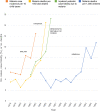Antimalarial Drug Resistance and Implications for the WHO Global Technical Strategy
- PMID: 33747712
- PMCID: PMC7955901
- DOI: 10.1007/s40471-021-00266-5
Antimalarial Drug Resistance and Implications for the WHO Global Technical Strategy
Abstract
Purpose of review: Five years have passed since the World Health Organization released its Global Technical Strategy for Malaria (GTS). In that time, progress against malaria has plateaued. This review focuses on the implications of antimalarial drug resistance for the GTS and how interim progress in parasite genomics and antimalarial pharmacology offer a bulwark against it.
Recent findings: For the first time, drug resistance-conferring genes have been identified and validated before their global expansion in malaria parasite populations. More efficient methods for their detection and elaboration have been developed, although low-density infections and polyclonality remain a nuisance to be solved. Clinical trials of alternative regimens for multidrug-resistant malaria have delivered promising results. New agents continue down the development pipeline, while a nascent infrastructure in sub-Saharan Africa for conducting phase I trials and trials of transmission-blocking agents has come to fruition after years of preparation.
Summary: These and other developments can help inform the GTS as the world looks ahead to the next two decades of its implementation. To remain ahead of the threat that drug resistance poses, wider application of genomic-based surveillance and optimization of existing and forthcoming antimalarial drugs are essential.
Keywords: Drug resistance; Malaria; Plasmodium; World Health Organization Global Technical Strategy for Malaria.
© The Author(s), under exclusive licence to Springer Nature Switzerland AG 2021.
Conflict of interest statement
Conflict of InterestThe authors declare no competing interests.
Figures
References
-
- World Health Organization. Official records of the World Health Organization No. 184, 23rd World Health Assembly: Geneva, World Health Organization; 1970.
-
- World Health Organization Expert Committee on Malaria Technical Report Series No. 357: World Health Organization Expert Committee on Malaria 13th Report. Geneva: World Health Organization; 1967. - PubMed
-
- World Health Organization. Global technical strategy for malaria 2016-2030. Geneva: World Health Organization; 2016.
-
- World Health Organization. World malaria report. Geneva: WHO Global Malaria Programme; 2019.
Publication types
Grants and funding
LinkOut - more resources
Full Text Sources
Other Literature Sources
Research Materials

